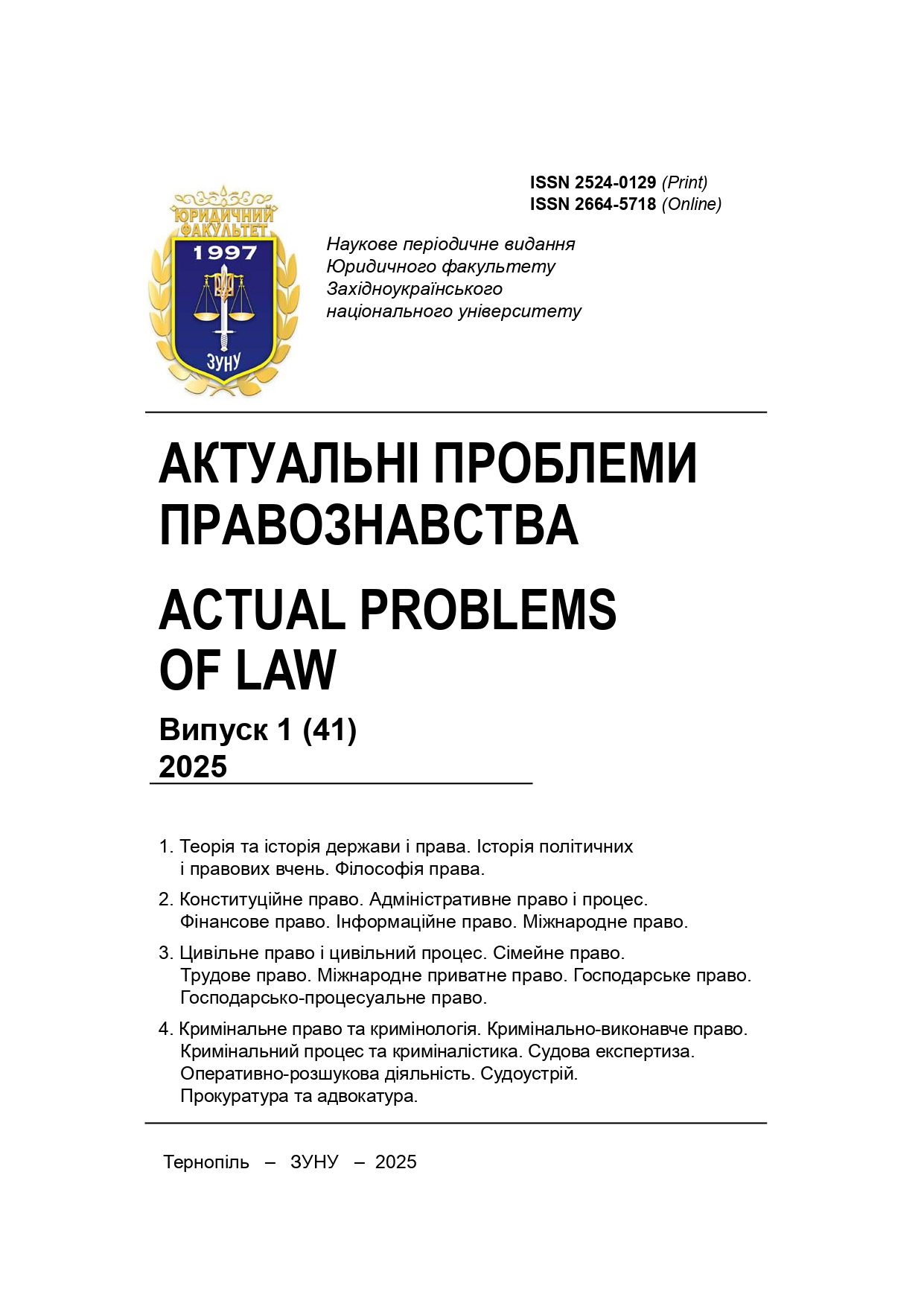Special means of law enforcement agencies: balancing efficiency and human rights
DOI:
https://doi.org/10.35774/app2025.01.233Keywords:
law enforcement agencies, special means, state, human rights, artificial intelligence, fight against crimeAbstract
This scientific article provides an in-depth examination of the complex and evolving landscape of special means employed by law enforcement agencies, analyzing practices both within the country and across international borders. It undertakes a comparative analysis of traditional special means, such as less-lethal weapons, surveillance equipment, and forensic techniques, alongside cutting-edge innovations like artificial intelligence, facial recognition software, predictive policing algorithms, and advanced data analytics. The article explores the specific applications of these technologies, evaluating their effectiveness in various law enforcement contexts, from crime prevention and investigation to crowd control and counterterrorism.
Furthermore, the research delves into the specialized training, deployment, and unique contributions of various animal species, including police dogs, horses, and even emerging examples like drone-sniffing canines or birds of prey used for surveillance or counter-drone operations. Beyond the technical aspects, the article critically considers the broader legal, ethical, and societal implications surrounding the use of such tools and technologies. It addresses the delicate balance between public safety and individual rights, focusing on issues of privacy, data security, potential biases in AI systems, and the responsible use of force. The authors present a comprehensive evaluation of the benefits and potential drawbacks associated with employing this diverse range of means in law enforcement activities, including considerations of cost-effectiveness, human resources, and community relations. Ultimately, the study concludes that a thorough and nuanced understanding of emerging special means and technologies, including AI and animal assistance, empowers law enforcement agencies with enhanced capabilities for crime resolution, proactive threat mitigation, and the overarching goal of ensuring societal safety and security. It also emphasizes the paramount importance of ongoing research and development in this rapidly evolving field to optimize the use of these tools while rigorously safeguarding fundamental rights, promoting transparency, and maintaining public trust.
The article further suggests areas for future research, including the development of ethical guidelines for AI in law enforcement, the need for robust oversight mechanisms, and the exploration of innovative training programs for law enforcement personnel in the effective and ethical use of these advanced tools.
The relevance of this scientific research lies in the increase in the volume of special means, which is due to scientific and technical progress, as in the case of artificial intelligence, and the possibility of studying the specifics of the experience of using special means by law enforcement agencies of different countries.
Downloads
References
Shevchuk, T. A. & Svystun, Ya. V. (2021). Vykorystannia shtuchnoho intelektu u protydii zlochynnosti [Using artificial intelligence to combat crime]. Visnyk Kryminolohichnoi asotsiatsii Ukrainy - Bulletin of the Criminological Association of Ukraine, 2 (25), 128–134 [in Ukrainian].
Tymchyshyn, A. M. (2023). Osoblyvosti vykorystannia spetsialnykh znan pid chas dosudovoho rozsliduvannia [Peculiarities of using specialized knowledge during pre-trial investigation]. Nove ukrainske pravo - New Ukrainian Law, 2, 176–184. DOI: https://doi.org/10.51989/NUL.2023.2.24 [in Ukrainian].
Kryminalnyi protsesualnyi kodeks Ukrainy [The Criminal Procedural Code of Ukraine]. 2012, April 13, No. 4651-VI. Retrieved from https://zakon.rada.gov.ua/laws/card/4651-17 [in Ukrainian].
Pro zatverdzhennia Instruktsii z orhanizatsii diialnosti kinolohichnykh pidrozdiliv Natsionalnoi politsii Ukrainy [On approval of the Instructions on the organization of the activities of canine units of the National Police of Ukraine]: Nakaz Ministerstva vnutrishnikh sprav Ukrainy vid 01.11.2016 № 1145. Retrieved from https://zakon.rada.gov.ua/laws/show/z1544-16#Text [in Ukrainian].
Buchko, M. O. (2019). Aktualni pytannia zastosuvannia spetsialnykh zasobiv pratsivnykamy natsionalnoi politsii [Current issues of the use of special means by national police officers]. Pidhotovka politseiskykh v umovakh reformuvannia systemy MVS Ukrainy - , 310-312 [in Ukrainian].
Zhbanchyk, A. V. & Boiko, O. I. (2022). Spetsialni zasoby v diialnosti politsii: nova kontseptsiia [Special means in police activity: a new concept]. Analituchno-porivnialne prawo - Analytical and comparative jurisprudence, 5, 212–216. DOI: https://doi.org/10.24144/2788-6018.2022.05.39 [in Ukrainian].
Tomina, V. Yu. & Mukoida, R. V. (2023). Osoblyvosti vykorystannia shtuchnoho intelektu v umovakh voiennoho stanu na terytorii Ukrainy [Features of the use of artifical intelligence under the conditions of marital state in the territiry of Ukraine]. Yurydychnyi naukovyi elektronnyi zhurnal - Legal scientific electronic journal, 6, 410–413. DOI: https://doi.org/10.32782/2524-0374/2023-6/95 [in Ukrainian].
Turuta, O. V. & Turuta, O. P. (2022). Shtuchnyi intelekt kriz pryzmu funda-mentalnykh prav liudyny [Artificial intelligence through the prism of fundamental human rights]. Naukovyi visnyk Uzhhorodskoho Natsionalnoho Universytetu - Scientific Bulletin of Uzhhorod National University, 21, 49–54. DOI: https://doi.org/10.24144/2307-3322.2022.71.7 [in Ukrainian].
Shevchuk, V., Matulienė, S. & Baltrūnienė, J. (2022). Shtuchnyi intelekt v diialnosti orhaniv pravoporiadku ta yustytsii: vitchyznianyi ta yevropeiskyi dosvid [Artificial intelligence in law enforcement and justice bodies: domestic and European experience]. Teoriia ta praktyka sudovoi ekspertyzy i kryminalistyky - Theory and practice of forensic examination and criminalistics, 4(29), 12–49. DOI: 10.32353/khrife.4.2022.02 [in Ukrainian].





